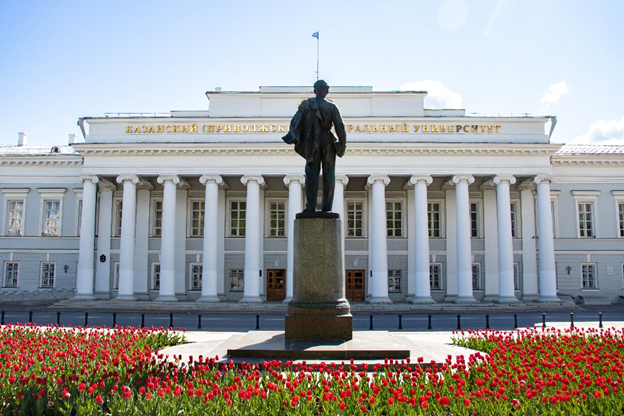Venue
The 10th Meeting of the BRICS Astronomy Working Group is scheduled to take place from 9 to 13 September 2024 in Kazan, Russian Federation at Kazan Federal University.
Phone: +7 843 206 52 89
Address: Russian Federation, Kazan, 18 Kremlyovskaya street
Website: https://eng.kpfu.ru/
Kazan is the capital of the Tatarstan Republic, Russia. The city lies at the confluence of the Volga and the Kazanka Rivers. Kazan is the fifth-largest city in Russia, being the most populous city on the Volga, as well as within the Volga Federal District. In April 2009, the Russian Patent Office granted Kazan the right to refer to itself as the "Third Capital of Russia".
The meeting will take place at the premises of the Kazan Federal University (KFU). Kazan Federal University was founded in 1804 and is the second oldest higher education institution in Russia. Over its history University gained international recognition and is associated with such outstanding names as mathematicians Nikolai Lobachevsky and Ippolit Gromeka, chemists Nikolai Zinin, Karl Klauss and Alexander Butlerov, an astronomer Ivan Simonov, physicists Evgeny Zavoisky and Simeon Altshuler, psychologists Vladimir Bekhterev and Alexander Luria, writers Leo Tolstoy and Sergei Aksakov, apolitical leader Vladimir Lenin.
The history of Kazan University is an integral part of the history of science, culture and education in Russia. Today Kazan Federal University is among the leading educational and research establishments in Russia consisting of 29 main structural units (institutions, faculties, schools, branches, lyceums, etc.) KFU continues to serve as a leading national research center, providing its students and staff, as well as academic visitors, with many laboratories, excellent museums, a botanical garden, research field stations, astronomic observatories and many other facilities. The University also has IT centers, publishing houses and a recreational center that is at the heart of the cultural and sporting life of the city.
The University is a recognized leader in international cooperation. Each year KFU members win dozens of grants from international foundations, involving themselves in projects with cutting-edge research centers in many countries. In 2023, more than 45000 students have studied at the university. The University has a total of 6,615 employees, including 3,000 scientific and pedagogical staff.
